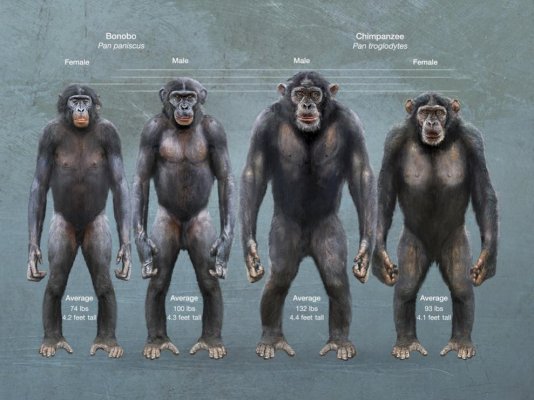Though very close in genetic relationship and virtually next-door neighbors, chimpanzees and a less-well-known species called bonobos in Zaire are socially poles apart. Only identified as a species separate from chimps in 1929, bonobos intrigue biologists with their easygoing ways, sexual equality, female bonding, and zeal for recreational sex.
How did bonobos, which live in humid forests south of the Zaire River, evolve such a different social structure from chimpanzees since the two species split about 2 million years ago? Male dominance plays a big role in chimp society. Disputes are often resolved by threatening displays or by fighting. Female chimps lead a life much more solitary than that their bonobo cousins, and are sometimes harassed by the much larger males. Sex is strictly about reproduction, and reproductive tactics can include infanticide -- the killing of offspring unrelated to a male chimp. Infanticidal individuals remove potential competitors to their own offspring, and the mother, without an infant to care for, will become available for mating again much sooner.
In contrast, bonobo society is marked by the strong bonds that develop between unrelated females and by almost constant sexual activity amongst all members of a group. Bonobos apparently use sex to reinforce bonds within the group and to resolve conflict. What evolutionary advantages do these behaviors offer?
Seeking the answer to that question, researchers noted that infanticide is almost unknown among bonobos. Their constant sexual activity obscurespaternity, removing the incentive for infanticide, and the pervasive bonding of female bonobos, who form coalitions for mutual support and protection, removes the opportunity. Preventing infanticide is a huge evolutionary advantage for bonobo females, because more of their offspring will survive.
Why, then, have chimps not evolved this social structure? The answer may lie in the history of the habitats they occupy. Both species of primates live in tropical forests along the Zaire River -- chimps north of the river, bonobos to the south. Their environments seem to be quite similar today. But about 2.5 million years ago, there seems to have been a lengthy drought in southern Zaire that wiped out the preferred food plants of gorillas and sent the primates packing. After the drought ended, the forests returned, but the gorillas did not.
Chimpanzees in this environment south of the river had the forest to themselves, and could exploit the fiber foods that had previously been eaten by gorillas -- foods that are still eaten by gorillas to the north. With this additional food to tide them over between fruit trees, they could travel in larger, more stable parties, and form strong social bonds. They became bonobos.
On the north side of the river, the chimps had to share their niche with gorillas, which eat the fiber foods. The chimps have to compete for fruit, and occasionally meat, food resources that tend to be widely scattered. Female chimps disperse into the forest with their infants to find enough to eat, and cannot spend time together to forge strong bonds. The changes in social behavior that occurred in response to this environmental factor may be what led chimps down a different evolutionary path, toward a society more prone to violence.

